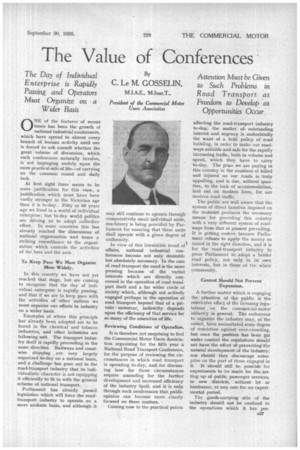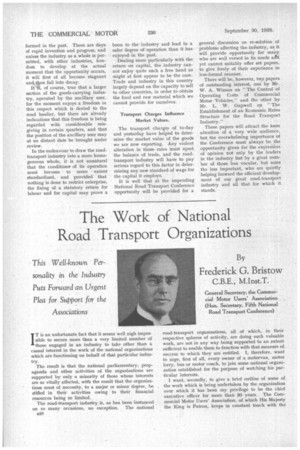The Value of Conferences
Page 41

Page 42

If you've noticed an error in this article please click here to report it so we can fix it.
By
C. Le M. GOSSELIN,
M.I.A.E., M.Inst.T., President of the Commercial Motor Users Association
ONE of the features of recent times has been the growth of national industrial conferences, which have spread to almost every branch of human activity until one is forced to ask oneself whether the great volume of discussion, which such conferences naturally involve, is not impinging unduly upon the more practical side of life—of carrying on the common round and daily task.
• At first sight there seems to be some justification for this view, a justification which must have been vastly stronger in the Victorian age than it is to-day. Fifty or 60 years ago we lived in a world of individual enterprise; but to-day world politics are driving us to adopt collective effort. In some countries this has already reached the dimensions of national organization and bears a striking resemblance to the organization which controls the activities of the bees and the ants.
To Keep Pace We Must Organize More Widely.
In this country we have not yet reached that stage, but are coming to recognize that the day of individual enterprise is rapidly passing, and that if we are to keep pace with the activities of other nations we must organize our. efforts in industry on a wider basis.
Examples of where this principle has already been adopted are to be found in the chemical and tobacco industries, and other industries are following suit. The transport industry itself is rapidly proceeding in the same direction. Railways and coastwise shipping are very largely organized to-day on a national basis, and. a challenge has gone out to the road-transport industry that its individualistic character is not equipping it efficiently to fit in with-the general scheme of national transport. .
Parliament has already passed legislation which will force the roadtransport industry to operate on a more uniform basis, and although it
may still continue to operate through comparatively small individual units, machinery is being provided by Parliament for ensuring that these units shall operate with a given degree of uniformity. In view of this irresistible trend of affairs, national industrial conferences become not only desirable but absolutely necessary. In the case of road transport the need is the more pressing because of the varied interests which are directly concerned in the operation of road trans.port itself and a far wider circle of society which, although not actively engaged perhaps in the operation of road transport beyond that of a private motorcar, indirectly depends upon the efficiency of that service for so many of the amenities of life.
Reviewing Conditions of Operation.
It is therefore not surprising to find the Commercial Motor Users Association organizing for the fifth year a National Road Transport Conference, for the purpose of reviewing the circumstances in which road transport is operating to-day, and for discussing how far those circumstances require amending for the further development and increased efficiency of the industry iteself, and it is only through such conferences that public opinion can become more clearly focused on these matters.
Coming now to the practical points affecting the road-transport industry to-day, the matter of. outstanding interest and urgency is undoubtedly the want of a bold policy of road building, in order to make our roadways suitable and safe for the rapidly increasing traffic, both in volume and .speed, which they have to carry to-day. The prige we are paying in this country in the numbers of killed and injured on our roads is truly appalling, and is due, without question, to the lack of accommodation, laid out on modern lines, for our modern road traffic.
The public are well aware that the system of direct taxation imposed on the motorist produces the necessary means for providing this country with a very different system of roadways from that at present prevailing, It is getting restive because Parliament refuses to apply the money so raised in the right direction, and it is for the road-transport industry to press Parliament to adopt a bolder road policy, not only in it& own interests, but in those of the whole community.
Control Should Not Prevent Expansion.
A further matter which is engaging the attention of the public is the reitrictiVe effect of the licensing regulations on the commercial-motor industry hi general. The endeavour to organize the industry may, at the outset, have necessitated some degree of restriction against over-crowding, but once the position has been got under control the regulations should not have the effect of preventing lhe natural development of the industry; nor should they discourage enterprise on the part of those engaged in it. It should still be possible for experiments to be made for the setting-. up of public passenger services, in new districts, without let or hindrance, At-any rate for an experimental period.
The goods-carrying side of the industry should not be confined to the operationswhich it has peran.
formed in the past. These are days of rapid invention and progress, and unless the industry as a whole is permitted, with other industries, freedom to develop at the actual moment that the opportunity occurs, it will first of all become stagnant and then fall into decay.
It IS, of course, true that a larger section of the goods-carrying industry, operated by the ancillary user, for the moment enjoys a freedom in this respect which is denied to the road haulier, but there are already indications that this freedom is being regarded with considerable misgiving in certain quarters, and that the position of the ancillary user may at no distant date be brought under review.
In the endeavour to draw the roadtransport industry into a more homogeneous whole, it is not unnatural that the condition, of its operation must become to some extent standardized, and provided that nothing is done to restrict enterprise, the fixing of a statutory return for labour and for capital may prove a boon to the industry and lead to a safer degree of operation than it has enjoyed in the past.
Dealing more particularly with the return on capital, the industry cannot enjoy quite such a free hand as might at first appear to be the case. Trade and industry in this country largely depend on the capacity to sell to other countries, in order to obtain the food and raw material which we cannot provide for ourselves.
Transport Charges Influence Market Values.
The transport charges of to-day and yesterday have helped to determine the market value of the goods we are now exporting. Any violent alteration in those rates must upset the balance of trade, and the roadtransport industry will have to pay serious regard to this factor in determining any new standard of wage for the capital it employs.
It is well that at the impending National Road Transport Conference opportunity will be provided for a general discussion on re-solution of problems affecting the-industry, as it will provide opportunity for many, who are well versed in its needs artd yet cannot suitably offer set papers, to give freely of their experience in less-formal manner.
There will be, however, twp papers of outstanding interest, one by Mr. W. A. Winson on " The Control of Operating Costs of Commercial Motor Vehicles," and the other by Mr. L. W. Gupwell on "The Establishment of an Economic Rates Structure for the Road Transport Industry."
These papers will attract the keen attention of a very wide audience, but the overwhelming importance of the Conference must always be the opportunity given for the expression of opinion not only by the leaders in the industry but by a great num'ber of those less vocular, but none the less important, who are quietly helping forward the efficient development of our great road-transport industry and all that for which it stands.




























































































